外研版七年级英语下册精选优秀教案 Module 12 Western music Unit 1 教学设计
新外研版七年级下册英语 Module 12 Unit 1 教案(教学设计)
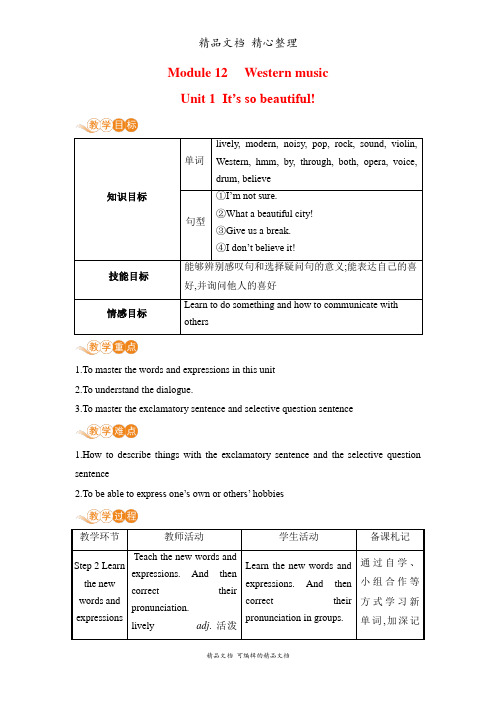
drumn.鼓believev.相信
Learn the new words and expressions. And then correct their pronunciation in groups.
通过自学、小组合作等方式学习新单词,加深记忆。
教学环节
教师活动
3.I likeWestern(西方的) food very much.
4.This story book is verypopular(受欢迎) with the children.
5.Ibelieve(相信) he willpass the exam.
Ⅱ.单项选择
1.He isn’t from Russia,_______? (D)
Module 12Western music
Unit 1It’s so beautiful!
知识目标
单词
lively, modern, noisy, pop, rock, sound, violin, Western, hmm, by, through, both, opera, voice, drum, believe
2.Work in groups to correct their mistakes.
通过让学生听关键词法训练学生的听力技能。
Step 4
Activity 2
Let students listen again,then work in pairs. Answer the questions about the conversation inActivity 1.
√
1.Read these questions carefully.
外研版七年级下册英语教学设计:《Module 12 Western music Unit 3》

外研版七年级下册英语教学设计:《Module 12 Western music Unit 3》一. 教材分析《Module 12 Western music Unit 3》主要介绍了西方音乐的发展历程和著名音乐家。
本节课的内容包括:1. 学习西方音乐的历史背景和发展;2. 了解著名音乐家如Mozart, Beethoven, Bach等;3. 掌握与音乐相关的词汇如:classical, rock, pop, jazz等;4. 培养学生的听说读写能力,提高他们对西方音乐的兴趣。
二. 学情分析七年级的学生已经掌握了一定的英语基础知识,对音乐也有一定的兴趣。
但他们对西方音乐的了解还不够深入,特别是对著名音乐家和音乐流派的认识。
因此,在教学过程中,需要注重激发学生的兴趣,帮助他们积累相关词汇,提高听说读写能力。
三. 教学目标1.知识目标:学生能够了解西方音乐的发展历程,认识著名音乐家,掌握与音乐相关的词汇;2.能力目标:学生能够听懂、会说、会读、会写与西方音乐相关的句子;3.情感目标:培养学生对西方音乐的兴趣,提高他们的音乐鉴赏能力。
四. 教学重难点1.重点:西方音乐的发展历程,著名音乐家,与音乐相关的词汇;2.难点:对西方音乐流派的认识,听说读写能力的运用。
五. 教学方法1.任务型教学法:通过完成各种任务,让学生在实践中学习西方音乐知识;2.情境教学法:创设各种情境,让学生在真实的环境中感受西方音乐的魅力;3.交际教学法:引导学生进行互动交流,提高他们的听说能力;4.游戏教学法:运用游戏,激发学生的学习兴趣,巩固所学知识。
六. 教学准备1.准备西方音乐的相关资料,如音频、视频、图片等;2.准备著名音乐家的简介和作品,方便学生了解;3.准备与音乐相关的词汇卡片,方便学生记忆;4.准备课堂用的听力材料和练习题。
七. 教学过程1.导入(5分钟)a.向学生问候,了解他们的心情;b.引导学生谈论他们喜欢的音乐,激发他们的学习兴趣;c.简要介绍本节课的内容,引导学生关注西方音乐。
外研版七年级英语下册《Module12WesternmusicUnit2》说课稿
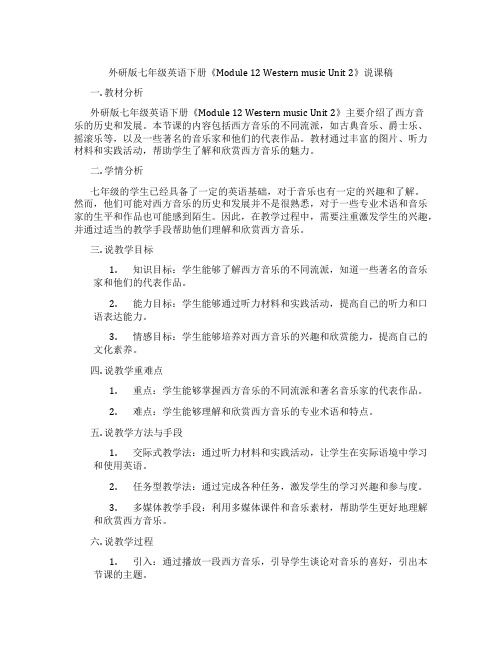
外研版七年级英语下册《Module 12 Western music Unit 2》说课稿一. 教材分析外研版七年级英语下册《Module 12 Western music Unit 2》主要介绍了西方音乐的历史和发展。
本节课的内容包括西方音乐的不同流派,如古典音乐、爵士乐、摇滚乐等,以及一些著名的音乐家和他们的代表作品。
教材通过丰富的图片、听力材料和实践活动,帮助学生了解和欣赏西方音乐的魅力。
二. 学情分析七年级的学生已经具备了一定的英语基础,对于音乐也有一定的兴趣和了解。
然而,他们可能对西方音乐的历史和发展并不是很熟悉,对于一些专业术语和音乐家的生平和作品也可能感到陌生。
因此,在教学过程中,需要注重激发学生的兴趣,并通过适当的教学手段帮助他们理解和欣赏西方音乐。
三. 说教学目标1.知识目标:学生能够了解西方音乐的不同流派,知道一些著名的音乐家和他们的代表作品。
2.能力目标:学生能够通过听力材料和实践活动,提高自己的听力和口语表达能力。
3.情感目标:学生能够培养对西方音乐的兴趣和欣赏能力,提高自己的文化素养。
四. 说教学重难点1.重点:学生能够掌握西方音乐的不同流派和著名音乐家的代表作品。
2.难点:学生能够理解和欣赏西方音乐的专业术语和特点。
五. 说教学方法与手段1.交际式教学法:通过听力材料和实践活动,让学生在实际语境中学习和使用英语。
2.任务型教学法:通过完成各种任务,激发学生的学习兴趣和参与度。
3.多媒体教学手段:利用多媒体课件和音乐素材,帮助学生更好地理解和欣赏西方音乐。
六. 说教学过程1.引入:通过播放一段西方音乐,引导学生谈论对音乐的喜好,引出本节课的主题。
2.讲解:通过多媒体课件,介绍西方音乐的不同流派和著名音乐家的代表作品。
3.听力练习:让学生听一段西方音乐,并回答相关问题,提高学生的听力能力。
4.实践活动:学生分组讨论,选择一位著名音乐家,介绍他的生平和作品,并展示给其他同学。
外研版英语七年级下册Module12WesternmusicUnit3教案
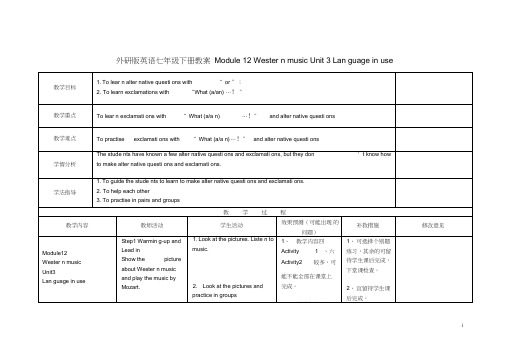
教学目标
1.To lear n alter native questi ons with“or”;
2.To learn exclamations with“What (a/an)…!”
教学重点
To lear n exclamati ons with“What (a/a n)…!”and alter native questi ons
十一Assignments
Ask the stude nts to readViennaNew
Year's Con cert.
Play the music about
New Year's Con cert.
Step10 Talking about
Chin ese music
Show the pictures and play Chin ese music.
five questi onswith
“or”in them.
exclamati onsandfive
questio ns with“or”
板书设计
二栏式
It's so beautiful!—Is this by Strauss or Mozart?
I love his music!—It's by Strauss.
教学难点
To practiseexclamati ons with“What (a/a n)…!”and alter native questi ons
学情分析
The stude nts have known a few alter native questi ons and exclamati ons, but they don't know how
外研版七年级英语下册 Module 12 Western Music Unit 3 Language in use教案

Book 2 Module 12 Western music一、教学内容:Unit3 Language in use二、课型:Revision and application三、教学目标:1.正确运用选择疑问句和祈使句。
2.收集相关信息,恰当的运用所学的词汇和句型向他人介绍中国音乐。
四、教学重难点:恰当的运用所学的词汇和句型向他人介绍中国音乐。
五、教学准备:本节课型为Revision and application,根据新课标的要求,结合教材和学生特点,主要采用任务型互动式进行教学,结合情景法、交际法、听说法、归纳法等教学方法实施课堂活动,开启学生思维,通过一系列有条理的教学活动,引导学生自主探究学习和与他人互动合作学习,让学生体验愉快学习。
本节课所需教具及资料:幻灯、图片、调查表等。
六、教学过程:1.Ask and ans wer questionsexc lamatory sentence.girls, I w ant you达标训练题一、完成下列反意疑问句:1. You like rock music, ________?2. They sing well, _________?3. He has written ten new songs this year, ________?4. He wrote traditional music, ________?5. She was a musician, _________?6. We can practise after school, ________?7. You don’t like this song, ______?8. They have never been to any concert, ________?9. This music isn’t very popular, _____?10. He has a lot of CDs, _________?二、把下列句子改写成感叹句。
外研版英语七年级下册Module 12 【教学设计】Module 12 Unit 1

Module 12 Western musicUnit 1 It’s so beautiful!本模块的主要语法是what 句式的感叹句,教学重点是通过对西方音乐的描述,重点学习本模块中出现的重点词汇、短语、固定搭配和句型。
课前准备一些西方音乐的图片和资料,让学生在warming-up 时讨论和观看。
围绕西方音乐这一话题展开听说读写的全面训练,使学生熟悉what 句式的感叹句并会使用。
掌握下列单词: noisy,rock, sound, violin, through, both, voice, drum, lively, modern, pop (=popular), Western, hmm, by, opera, believe, musician, centre (=center), century, European, composer, elder, waltz, poor, perfect, piece, classical, another, dance music 和sad 。
【语言技能目标】1. 能听懂谈论音乐的简单对话,能判断描述的事实。
2. 能用感叹句表达自己的感受。
3. 能够读懂简单的描写音乐的短文,掌握短文通篇大意,并学习使用上下文猜测词义的学习方法。
4. 能用感叹句表达自己感受。
【情感目标】通过对西方音乐的了解,培养热爱生活、热爱音乐、积极乐观的精神。
【教学重点】1. To learn the reading method.2. To master the imperative sentence.【教学难点】To master the imperative sentence.PPT课件、挂图、录音机、课堂练习表格、奖品。
To give some pictures about Western singer to students. Such as Beethoven and Strauss. Letthem watch and talk about them.Step2:Work in pairs. Listen and number the words as you hear them.( ) lively ( ) modern ( ) music( ) noisy ( ) pop ( ) rock( ) sound ( ) violin ( ) WesternKeys: lively – 7 modern – 5 music – 1 noisy - 9 pop – 8 rock – 6 sound – 3 violin – 4 Western - 2Step3:Work in pairs. Answer the questions about the conversation in Activity 1. And thenlisten again and check.1.Which modern music does Tony like?2. What does Tony’s mum think about rock music?3. Why doesn’t Tony like traditional Western music?4. Which music does Tony’s dad think is too noisy?Keys:1. He likes pop and rock music.2. It’s lively.3. It’s too slow.4. He thinks pop music is too noisy.Step4:Listen and read the Activity 3. And then check (√) the true sentences.( ) 1. They’re listening to Western music.( ) 2. Tony knows little about Strauss.( ) 3. Strauss was born in the capital of Australia.( ) 4. The Blue Danube is pop music.( ) 5. Lingling enjoys Beijing opera very much.Keys: 1.√ 2. √ 3. × 4. × 5. √Step5:To study Everyday English.。
最新外研版七年级英语下册 Module 12 Western Music Unit 3 Language in use教案

Book 2 Module 12 Western music一、教学内容:Unit3 Language in use二、课型:Revision and application三、教学目标:1.正确运用选择疑问句和祈使句。
2.收集相关信息,恰当的运用所学的词汇和句型向他人介绍中国音乐。
四、教学重难点:恰当的运用所学的词汇和句型向他人介绍中国音乐。
五、教学准备:本节课型为Revision and application,根据新课标的要求,结合教材和学生特点,主要采用任务型互动式进行教学,结合情景法、交际法、听说法、归纳法等教学方法实施课堂活动,开启学生思维,通过一系列有条理的教学活动,引导学生自主探究学习和与他人互动合作学习,让学生体验愉快学习。
本节课所需教具及资料:幻灯、图片、调查表等。
六、教学过程:教学步骤教师活动学生活动活动目的1. Leading-in (7’)1. To give sometime to thestudent s to goover all the newwords of thismodule.2. Play a game.Give theinstructions ofthe game.3. Help thestudents have adictation of thisunit.1. Revise all the new wordsand phrases of this module.Then, play a competition,2. One student stand up andsay out a phrases and theother say the exclamatorysentence like this:S1: a beautiful girlS2: What a beautiful girl!3. Have a dictation.Review and consolidatethe new words , somephrases and theexclamatory sentence.2.While-task(17’)1. T: Ok, we’velearnt somethingabout severalfamous persons ,now let’s try toask some questionsabout them.2. After that,have studentsfinish Activity 1on the book.1.Ask and ans wer questionsabout Mark Twain, JohannStrauss the younger, JohannStrauss the elder and Mozartin pairs.2. Finish Activity 1 on thebook.Review and consolidatethe context of thismodule by asking andanswering thequestions.1.Ask thestudents tofinishActivity2 andsum up theusage ofexclamatorysentence.2.FinishActivity3 &4. 1.Sum up the usage ofexc lamatory sentence.2.Finish Activity3 &4.Consolidate the sum upthe usage ofexclamatory sentencethat they’ve learned.3. Post-task (19’) Organization:1. Now, boys andgirls, I w ant youto writeso mething aboutBeeth ovenaccording to theinformation onActivity 4. Andask someone towrite theircomposition onthe blackboard.2. Have studentscorrect theircompositions.1. Students try write thecomposition: The life ofBeethoven.2. Try to correct thestudent’s composition onthe b lackboard carefullyand exchange with theirseatmates.1. To practice theskill of speaking, andthen try to write.2. Enable students towrite something aboutsomebody.4. Summary (1’)Sum up the keystructures ofexclamatorysentence andrhetoricalquestion.Students conclude the usageof the key structure.Let the studentsinternalize thegrammar they’velearned in this module.5. Homework(1’)Revision of Modules 10 to 12 and get ready for a test.板书设计Module 12 Western musicUnit 3 Language in useWhat a beautiful city!Do you like traditional Western music or pop music?达标训练题一、完成下列反意疑问句:1. You like rock music, ________?2. They sing well, _________?3. He has written ten new songs this year, ________?4. He wrote traditional music, ________?5. She was a musician, _________?6. We can practise after school, ________?7. You don’t like this song, ______?8. They have never been to any concert, ________?9. This music isn’t very popular, _____?10. He has a lot of CDs, _________?二、把下列句子改写成感叹句。
外研版七年级下册英语精品教案 Module 12 Unit 1教案

Module 12 Western musicUnit 1 It’s so beautiful!一、教学目标:【知识能力目标】1) 能够正确使用下列单词和词组:modern, noisy, pop, sound, by, both, voice, believe, rock, lively, violin, Western...2) 能正确使用本单元重点句型【情感态度目标】通过对西方音乐的了解,培养热爱生活、热爱音乐、积极乐观的精神。
二、教学重难点【教学重点】能够听懂对音乐的简单描述,并能辨别感叹句和选择疑问句的意思。
【教学难点】能用所学表达自己的喜好和询问他人的喜好。
三、教学过程Step 1 Warming-up and Lead in1. Show some pictures about Western music and play The Blue Danube.2. Introduce these kind of music and show out these new words: traditional Western music, quiet, pop music, lively, rock music, noisy, Beijing OperaStep 2 Work in pairsListen and number the words as you hear them.( ) lively ( ) modern ( ) music( ) noisy ( ) pop ( ) rock( ) sound ( ) violin ( ) WesternStep 3 Work in pairs. Answer the questions about the conversation in Activity 1. And then listen again and check.1. Which modern music does Tony like?2. What does Tony’s mum think about rock music?3. Why doesn’t Tony like traditional Western music?4. Which music does Tony’s dad think is too noisy?Step 4 Listen and read1. Listen and answer the question:(1) What is the name of the first piece of music?(2) Does Daming like rock music?2. Read and finish the exercises of Activity 4.1) They’re listening to Western music.2) Tony knows little about Strauss.3) Strauss was born in the capital of Australia.4) The Blue Danube is pop music.5) Lingling enjoys Beijing opera very much.3. Ask students to read the dialogue and try to find out some important sentences by themselves:(1)...this is Western music, isn’t it?(2)It’s so beautiful!(3)Is this by Strauss or Mozart?(4)What a beautiful city!(5) You listen to pop music, Lingling, don’t you?4.After the reading, have the students finish Activity5.believe both drum German noisy voice1) Strauss wasn’t ______. He came from Austria.2) Daming thinks the ______ in rock music are too ______.3) Tony can’t ______ that Daming doesn’t like rock music.4) Betty likes ______ traditional Western music and pop music.5) Tony thinks the sound of the ______ in Beijing Opera is very different.Step 5 To study Everyday English.¤ What a beautiful city!¤ I’m a fan of rock music.¤ Give us a break!¤ I don’t believe it!Step 6 Complete the sentences about yourself.1. My favourite music is …2. I like it because ...3. My parents like ...Step 7 Speaking1. Listen and read.1)What a beautiful city!2)It’s so beautiful!3) I love his music!4) Listen to this!2. Work in pairs. Ask and answer the questions about the music you like or don’t like. — What music do you like?—I like pop. It’s lively and good to dance to, but I don’t like rock. It’s too noisy. What about you?Step 8 Language Points1. It goes through Vienna.through 意为“穿过,经过”,常与pass, go, walk 等动词连用。
最新外研版七年级英语下册 Module12 集体备课教案含教学反思

Module 12 Western musicUnit l 第1课时自主学习方案1.学生自学新词汇(见教材P110)。
2.学生自学教材(P72),找出课文中重点词组和句子。
课堂导学方案Step 1情景导入教师询问学生听过莫扎特的钢琴曲吗?然后播放莫扎特的《摇篮曲》让孩子们听,再询问孩子们好听吗?环节说明:教师的问话及播放的《摇篮曲》直接导入本节要接触的语言学习目标——西方音乐。
学生们一定会有很大的兴趣来积极参入本节教学活动中去。
Step 2完成教材1~2的任务1.熟读任务1里方框里的词汇,为下列任务做准备。
2.听录音,按照所听到的顺序给单词编号,完成任务1。
3.结对练习,回答有关活动1中对话的问题,完成任务2。
4.小结训练。
汉译英。
(1)Her class is always lively (活泼的).(2)Shanghai is a big and modern (现代的)city.(3)Why doesn’t Tony like traditional Western(西方的)music?环节说明:此环节是让学生熟练掌握新词汇。
Step 3完成教材3的对话理解1.大声朗读2,学生自己理解短文,然后找出重难点句子。
2.教师详细讲解。
学生熟记语言重点。
3.放录音,学生跟读。
熟悉教材,培养语感。
4.小结训练。
(C)(1)—It is a lovely day, isn’t it?—__________.We’ll go on a picnic today.A. Yes, it isn’tB. No, it isC. Yes, it isD. No, it isn’t(B)(2)Tony and his friends are going camping, __________?A. are theyB. aren’t theyC. is heD. isn’t he(B)(3)—I think today is nice for a field trip.—I think so. ___________!A. What lovely dayB. What a lovely dayC. How lovely dayD. Is it a lovely day环节说明:通过教师讲解,学生的理解记忆,小结训练让学生掌握本节的重点语言知识。
初一七年级英语下册外研版Module 12 Western music 教案
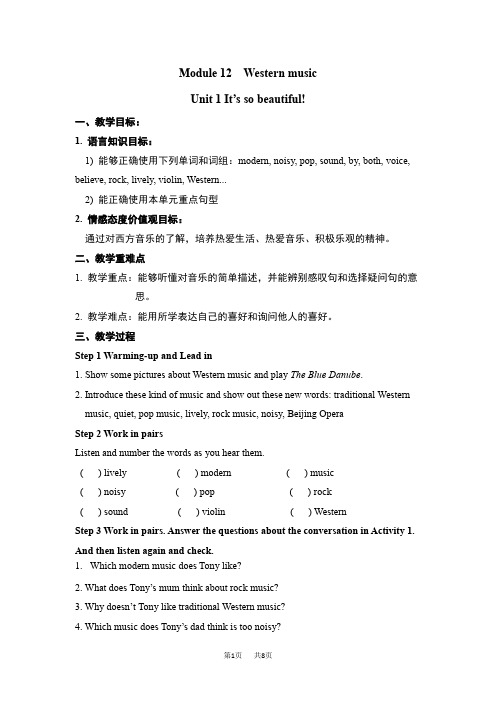
Module 12 Western musicUnit 1 It’s so beautiful!一、教学目标:1. 语言知识目标:1) 能够正确使用下列单词和词组:modern, noisy, pop, sound, by, both, voice, believe, rock, lively, violin, Western...2) 能正确使用本单元重点句型2. 情感态度价值观目标:通过对西方音乐的了解,培养热爱生活、热爱音乐、积极乐观的精神。
二、教学重难点1. 教学重点:能够听懂对音乐的简单描述,并能辨别感叹句和选择疑问句的意思。
2. 教学难点:能用所学表达自己的喜好和询问他人的喜好。
三、教学过程Step 1 Warming-up and Lead in1. Show some pictures about Western music and play The Blue Danube.2. Introduce these kind of music and show out these new words: traditional Western music, quiet, pop music, lively, rock music, noisy, Beijing OperaStep 2 Work in pairsListen and number the words as you hear them.( ) lively ( ) modern ( ) music( ) noisy ( ) pop ( ) rock( ) sound ( ) violin ( ) WesternStep 3 Work in pairs. Answer the questions about the conversation in Activity 1. And then listen again and check.1.Which modern music does Tony like?2. What does Tony’s mum think about rock music?3. Why doesn’t Tony like traditional Western music?4. Which music does Tony’s dad think is too noisy?Step 4 Listen and read1. Listen and answer the question:(1) What is the name of the first piece of music?(2) Does Daming like rock music?2. Read and finish the exercises of Activity 4.1) They’re listening to Western music.2) Tony knows little about Strauss.3) Strauss was born in the capital of Australia.4) The Blue Danube is pop music.5) Lingling enjoys Beijing opera very much.3. Ask students to read the dialogue and try to find out some important sentences by themselves:(1)...this is Western music, isn’t it?(2)It’s so beautiful!(3)Is this by Strauss or Mozart?(4)What a beautiful city!(5) You listen to pop music, Lingling, don’t you?4.After the reading, have the students finish Activity5.1) Strauss wasn’t ______. He came from Austria.2) Daming thinks the ______ in rock music are too ______.3) Tony can’t ______ that Daming doesn’t like rock music.4) Betty likes ______ traditional Western music and pop music.5) Tony thinks the sound of the ______ in BeijingOpera is very different. Step 5 To study Everyday English.¤ What a beautiful city!¤ I’m a fan of rock music.¤ Give us a break!¤ I don’t believe it!Step 6 Complete the sentences about yourself.1. My favourite music is …2. I like it because ...3. My parents like ...Step 7 Speaking1. Listen and read.1)What a beautiful city!2)It’s so beautiful!3) I love his music!4) Listen to this!2. Work in pairs. Ask and answer the questions about the music you like or don’t like. — What music do you like?— I like pop. It’s lively and good to dance to, but I don’t like rock. It’s too noisy.What about you?Step 8 Language Points1. It goes through Vienna.through 意为“穿过,经过”,常与pass, go, walk 等动词连用。
外研版英语七年级下册Module 12 教学设计

Module12 Western music一、教学内容:Unit1 It’s so beautiful!二、课型:Listening and speaking三、教学目标:1、能够正确使用下列单词和词组:modern, noisy, pop, sound, by, both,both,voice, believe, rock, lively, violin, western,classical…2、能正确使用下列句型:Is this …or…?Do you like …or…?You listen to pop music, don’t you?It’s very different, isn’t it?What a beautiful city!3、能够听懂对音乐的简单描述。
4、能辨别感叹句和选择疑问句的意思。
5、通过学习,能表达自己的喜好,并询问他人的喜好。
教学重难点:1、能够听懂对音乐的简单描述,并能辨别感叹句和选择疑问句的意思。
2、能用所学表达自己的喜好和询问他人的喜好。
(难点)四、教学准备:课堂整体运用任务型教学模式,培养学生独立自主的学习能力。
本课指导学生通过听说获取信息,培养学生的听说技能。
在教学过程中,采用多媒体手段辅助教学,利用各种图片、实物和习题任务贯穿整个教学过程。
因此,本节课需准备:PPT课件、挂图、录音机、实物、课堂练习表格、奖品五、教学过程:七、板书设计:Module 9 Western musicUnit1.It’s so beautiful.Is this …or…?Do you like …or…?You listen to pop music, don’t you?It’s very different, isn’t it?What a beautiful city!达标训练题一、完成下列反问疑问句:1. You are Chinese, ______________?2. You don’t like music, ______________?3. There is little water in the bowl, ______________?4. He never talks to you, _____________________?5. You watched TV last night, ____________________?二、选择正确的答案:( ) 1. I like the song, is it _________ Kelly?A. inB. byC. makeD. bye( ) 2. — What is it ___________、—Gone with the WindA. byB. callC. calledD. calls( ) 3.Children’s Day is in June, ____________?A. was itB. it wasC. is itD. it is( )4. The train is going _________ the tunnel (隧道), so it’s dark.A. crossB. acrossC. crossD. past( )5. What _____________children!A .a B. good C. a good D. good aModule 12 Western music六、教学内容:Unit2 Vienna is the centre of European classical music.七、课型:Reading and writing八、教学目标:1、能够正确使用下列单词和词组:centre, European, classical, century, composer,poor, another, poor, perfect…Key sentences:In the eighteenth century……, called…He played not only…but also…His… made him famous all over…2、能够读懂有关音乐以及人物介绍的文章,掌握其细节内容。
外研版英语七年级下英语《Module 12 Western music Unit 3》教学设计

外研版英语七年级下英语《Module 12 Western music Unit 3》教学设计一. 教材分析本课是外研版英语七年级下册的Module 12 Western music Unit 3。
本单元的主题是西方音乐,主要介绍了一些著名的西方音乐家和他们的代表作品。
本课的内容包括:音乐家的简介、音乐家的代表作品、音乐家的成就等。
通过本课的学习,学生可以了解一些西方音乐家的生平事迹,提高自己的英语听力水平和口语表达能力。
二. 学情分析学生在之前的学习中已经掌握了一些西方文化的基本知识,对西方音乐也有一定的了解。
但是,学生的英语水平参差不齐,部分学生对英语的听说能力较弱。
因此,在教学过程中,需要关注学生的个体差异,尽量让每个学生都能参与到课堂活动中来。
三. 教学目标1.知识目标:–学生能够听懂、会说、会读本课的生词和短语。
–学生能够理解并运用本课所学的句子结构。
–学生能够了解一些西方音乐家的生平事迹和代表作品。
2.能力目标:–学生能够用英语进行简单的对话,提高自己的听说能力。
–学生能够通过查阅资料,了解更多关于西方音乐家的信息。
3.情感目标:–学生能够尊重不同的文化,增强自己的跨文化交际能力。
–学生能够培养对音乐的热爱,提高自己的生活品质。
四. 教学重难点•学生能够听懂、会说、会读本课的生词和短语。
•学生能够理解并运用本课所学的句子结构。
•学生能够用英语进行关于西方音乐家的生平事迹和代表作品的描述。
•学生能够通过查阅资料,了解更多关于西方音乐家的信息。
五. 教学方法1.任务型教学法:通过设计各种任务,让学生在完成任务的过程中,提高自己的英语听说能力和交际能力。
2.情境教学法:通过创设各种情境,让学生在真实的语言环境中,提高自己的英语运用能力。
3.合作学习法:通过小组合作,让学生在互动交流中,共同完成学习任务。
六. 教学准备1.教师准备:–教师需要熟悉教材内容,明确教学目标。
–教师需要准备相关的教学材料,如PPT、图片、视频等。
2020-2021学年七年级英语外研版下册Module12Westernmusic.教案

2.教学难点
-词汇记忆:学生对乐器和音乐类型词汇的拼写和意义记忆可能存在困难,需要通过重复、游戏和实际操作等方法加深印象。
-句型运用:如何在不同情境下灵活运用所学句型表达音乐感受和喜好,是学生需要突破的难点。
-语法理解:理解现在进行时态在描述音乐活动时的用法,尤其是动词的进行时形式,可能对学生来说是个挑战。
(五)总结回顾(用时5分钟)
今天的学习,我们了解了西方音乐的基本类型、代表音乐家以及音乐在生活中的应用。同时,通过实践活动和小组讨论,我们也加深了对音乐的理解。我希望大家能够掌握这些知识点,并在日常生活中欣赏和分享音乐。最后,如果有任何疑问或不明白的地方,请随时向我提问。
五、教学反思
在今天的教学中,我尝试通过不同的活动和讨论,让学生们对Module 12 Western music产生兴趣。我发现,音乐作为一种跨文化的语言,确实能够激发学生的学习热情。在导入环节,通过询问学生们的音乐喜好,我看到了他们眼中闪烁的好奇和期待,这为接下来的教学奠定了良好的基础。
课堂上,我注意到学生在理论介绍环节对新词汇的学习较为被动,可能是因为词汇的记忆对他们来说有一定的难度。在今后的教学中,我需要更多地运用互动和游戏化的方法,帮助他们更好地记忆和理解新词汇。
在新课讲授中,通过案例分析,学生们对西方音乐有了更直观的认识。但在重点难点解析时,我发现学生对现在进行时态的运用还不够熟练,需要我在课后设计更多的练习来加强这一方面的训练。
-口头表达:在模块任务中,如何流畅、准确地介绍音乐家或乐队,结合词汇和句型进行连贯表达,是学生的难点之一。
-文化差异理解:对于西方音乐文化背景的理解,如何将所学知识与实际文化情境相结合,可能需要额外的引导和练习。
外研版七年级下册英语《Module 12 Western music Unit 1》教学设计6

外研版七年级下册英语《Module 12 Western music Unit 1》教学设计6一. 教材分析《Module 12 Western music Unit 1》主要介绍了西方音乐的历史和发展,包括不同时期的音乐风格和著名音乐家。
本节课的教学内容主要包括:音乐的基本元素(如节奏、旋律、和声等),不同音乐风格的特征(如古典、浪漫、现代等),以及西方著名音乐家的代表作品。
教材内容丰富,旨在培养学生对西方音乐的兴趣和认识,提高他们的音乐素养。
二. 学情分析七年级的学生对音乐有一定的兴趣和鉴赏能力,但西方音乐的历史和文化背景知识相对较为薄弱。
因此,在教学过程中,教师需要帮助学生建立起音乐与文化背景的联系,引导学生理解不同音乐风格的形成背景和发展趋势。
此外,学生对英语的学习兴趣和积极性也需要被激发,以便更好地投入到英语学习中。
三. 教学目标1.知识目标:–学生能够了解西方音乐的基本元素和不同音乐风格的特征。
–学生能够掌握西方著名音乐家的代表作品和生平事迹。
2.能力目标:–学生能够运用英语描述音乐的基本元素和不同音乐风格。
–学生能够通过听、说、读、写等多种方式,提高自己的英语综合运用能力。
3.情感目标:–学生能够培养对西方音乐的兴趣和鉴赏能力。
–学生能够在学习过程中,增强团队协作意识和自主学习能力。
四. 教学重难点•学生能够掌握西方音乐的基本元素和不同音乐风格的特征。
•学生能够运用英语描述音乐的基本元素和不同音乐风格。
•学生能够理解西方著名音乐家的代表作品和生平事迹。
•学生能够在实际情境中,运用英语进行音乐鉴赏和交流。
五. 教学方法1.任务型教学法:通过设计各种任务,让学生在实践中学习英语,提高他们的综合运用能力。
2.情境教学法:创设音乐相关的情境,让学生在真实的环境中感受和理解英语。
3.小组合作学习:鼓励学生之间进行合作交流,培养他们的团队协作能力和自主学习能力。
六. 教学准备1.教学材料:教材、多媒体课件、音乐资料等。
外研版七年级下册英语《Module12WesternmusicUnit1》说课稿5

外研版七年级下册英语《Module 12 Western music Unit 1》说课稿5一. 教材分析《Module 12 Western music Unit 1》是外研版七年级下册英语教材的一部分,本节课主要介绍了西方音乐的历史和发展。
通过对西方音乐的了解,让学生们能够提高自己的跨文化交际能力,培养对不同文化的尊重和理解。
教材内容丰富,包括西方音乐的基本概念、不同时期的音乐特点、著名音乐家和他们的作品等。
此外,教材还提供了丰富的听、说、读、写活动,帮助学生全面提高英语能力。
二. 学情分析七年级的学生已经具备了一定的英语基础,对学习新知识有一定的热情和兴趣。
但是,由于年龄和经历的限制,他们对西方音乐的了解相对较少,可能会对一些音乐家和作品感到陌生。
因此,在教学过程中,我需要注重引导学生主动探索、积极参与,激发他们对西方音乐的兴趣和热情。
三. 说教学目标1.知识目标:学生能够掌握西方音乐的基本概念、不同时期的音乐特点、著名音乐家和他们的作品等。
2.能力目标:学生能够运用所学的西方音乐知识进行听、说、读、写活动,提高自己的英语能力。
3.情感目标:通过学习西方音乐,培养学生对不同文化的尊重和理解,提高他们的跨文化交际能力。
四. 说教学重难点1.重点:西方音乐的基本概念、不同时期的音乐特点、著名音乐家和他们的作品。
2.难点:对西方音乐专业术语的理解和运用,以及对一些生僻音乐家和作品的了解。
五. 说教学方法与手段1.教学方法:采用任务型教学法,让学生在完成任务的过程中学习西方音乐知识,提高英语能力。
2.教学手段:利用多媒体教学设备,播放西方音乐作品,帮助学生更好地理解和学习。
六. 说教学过程1.导入:通过播放一首西方音乐作品,引起学生的兴趣,然后简要介绍本节课的内容。
2.课堂活动:学生分组讨论,每组选择一个音乐家或作品进行研究,了解其背景和特点。
3.分享与展示:每组向全班展示他们的研究成果,其他学生进行评价和讨论。
2021年外研版七年级英语下册Module12 Unit1 教案.doc

课题:Module 12 Western music(第 1 课时)备注1.知识与技能:A) To understand a conversation about music.[来源:学科网ZXXK]B) To master some words and expressions: noisy, rock, sound, violin, through,both, voice, drum, lively, modern, pop (=popular), Western, hmm, by, opera, believe, musician,2.过程与方法:I nteractive approach3.情感、态度、价值观:To be glad to know about western music, and respect the foreign culture.二、教学重、难点1.教学重点:Key words:oisy, rock, sound, violin, through, both, voice, drum, lively, modern, pop (=popular), Western, hmm, by, opera, believe, musician, centre (=center), century, Eur opean, composer, elder, waltz, poor, perfect, piece, classical, another, dance music和sad。
2.教学难点:To make a new dialogue in pa irs.三、主要教学方法:Task-based method and interactive approach四、教学实施时间: 6 月9 日星期一五、教学组织过程:教学导入:Dictation of the words in M12U1教学活动(一):Warming upStep1:Warming-up and Lead in[来源:学科网Z.X.X.K]To give some pictures about Western singer to students. Such as Michael Jacksonand the Musikverein in Vienna. Let them watch and talk about them. [来源学科网ZXXK]Step2:Work in pairs. Listen and number the words as you hear them.教学活动(二):Revision of the words.Step 1:Work in pairs. Answer the questions about the conversation in Activity 1.And then listen again and check.1.Which modern music does Tony like?2. What does Tony’s mum think about rock music?3. Why doesn’t Tony like traditional Western music?4. Which music does Tony’s dad think is too noisy?Step2:Listen and read the Activity 3. And then check (√) the t rue sentences.Step3:To study Every day English.¤ What a beautiful city!¤ I’m a fan of rock music.¤ Give us a break!¤ I don’t believe it![来源学_科_网]Step6:Check the t ypes of music the students like (√) and don’t like (x).教学活动(四):Reading practice1.Play the radio and ask Ss to read after it.2.Finish the exercise in Activity 33.Read the dialogue in Activity 3 and present it by pairs.教学小结:Different body language in different countries present different culture.六、课后分类作业:All Ss:1. Recite bow to nose in Module 11.2. English weekly:All the exercise in Unit 1Last 10:抄写M12单词,一个英语汉语五遍七、板书设计:黑板左侧教学重点:This is beautiful music. →What beautiful music this is!How beautiful this music is!八、安全提示:放学回家不要在路上嬉闹,注意交通安全九、课后反思:[来源学科网Z|X|X|K]审核盖章:年月日。
外研版英语(新标准)七年级下册Module 12 Western music教案
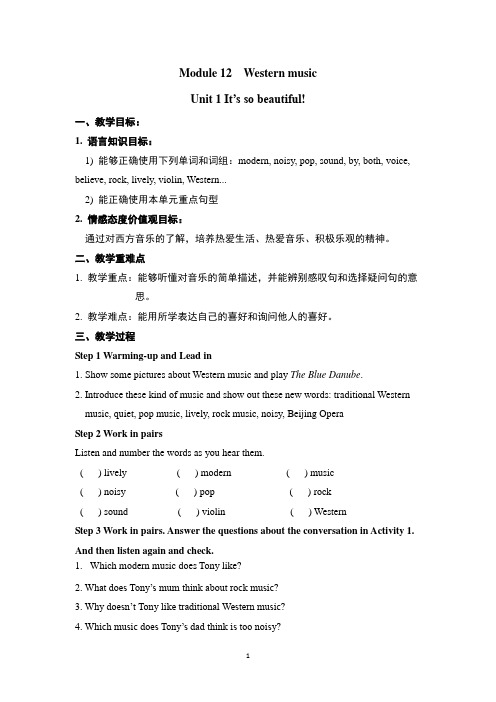
Module 12 Western musicUnit 1 It’s so beautiful!一、教学目标:1. 语言知识目标:1) 能够正确使用下列单词和词组:modern, noisy, pop, sound, by, both, voice, believe, rock, lively, violin, Western...2) 能正确使用本单元重点句型2. 情感态度价值观目标:通过对西方音乐的了解,培养热爱生活、热爱音乐、积极乐观的精神。
二、教学重难点1. 教学重点:能够听懂对音乐的简单描述,并能辨别感叹句和选择疑问句的意思。
2. 教学难点:能用所学表达自己的喜好和询问他人的喜好。
三、教学过程Step 1 Warming-up and Lead in1. Show some pictures about Western music and play The Blue Danube.2. Introduce these kind of music and show out these new words: traditional Western music, quiet, pop music, lively, rock music, noisy, Beijing OperaStep 2 Work in pairsListen and number the words as you hear them.( ) lively ( ) modern ( ) music( ) noisy ( ) pop ( ) rock( ) sound ( ) violin ( ) WesternStep 3 Work in pairs. Answer the questions about the conversation in Activity 1. And then listen again and check.1.Which modern music does Tony like?2. What does Tony’s mum think about rock music?3. Why doesn’t Tony like traditional Western music?4. Which music does Tony’s dad think is too noisy?Step 4 Listen and read1. Listen and answer the question:(1) What is the name of the first piece of music?(2) Does Daming like rock music?2. Read and finish the exercises of Activity 4.1) They’re listening to Western music.2) Tony knows little about Strauss.3) Strauss was born in the capital of Australia.4) The Blue Danube is pop music.5) Lingling enjoys Beijing opera very much.3. Ask students to read the dialogue and try to find out some important sentences by themselves:(1)...this is Western music, isn’t it?(2)It’s so beautiful!(3)Is this by Strauss or Mozart?(4)What a beautiful city!(5) You listen to pop music, Linglin g, don’t you?4.After the reading, have the students finish Activity5.1) Strauss wasn’t ______. He came from Austria.2) Daming thinks the ______ in rock music are too ______.3) Tony can’t ______ that Daming doesn’t like rock music.4) Betty likes ______ traditional Western music and pop music.5) Tony thinks the sound of the ______ in BeijingOpera is very different. Step 5 To study Everyday English.¤ What a beautiful city!¤ I’m a fan of rock music.¤ Give us a break!¤ I don’t believe it!Step 6 Complete the sentences about yourself.1. My favourite music is …2. I like it because ...3. My parents like ...Step 7 Speaking1. Listen and read.1)What a beautiful city!2)It’s so beautiful!3) I love his music!4) Listen to this!2. Work in pairs. Ask and answer the questions about the music you like or don’t like. — What music do you like?—I like pop. It’s lively and good to dance to, but I don’t like rock. It’s too noisy.What about you?Step 8 Language Points1. It goes through Vienna.through 意为“穿过,经过”,常与pass, go, walk 等动词连用。
七年级英语下册 Module 12 Western music Unit 1 It’s so beautiful教案 (新版)外研版

Module 12 Unit 1 It’s so beautiful!Step1:Warming-up and Lead inTo give some pictures about Western singer to students. Such as Michael Jackson and the Musikverein in Vienna. Let them watch and talk about them.Step2:Work in pairs. Listen and number the words as you hear them.( ) lively ( ) modern ( ) music( ) noisy ( ) pop ( ) rock( ) sound ( ) violin ( ) WesternKeys: lively – 7 modern – 5 music – 1 noisy - 9 pop – 8 rock – 6 sound – 3 violin – 4 Western - 2Step3:Work in pairs. Answer the questions about the conversation in Activity 1. And then listen again and check.1.Which modern music does Tony like?2. What does Tony’s mum think about rock music?3. Wh y doesn’t Tony like traditional Western music?4. Which music does Tony’s dad think is too noisy?Keys:1. He likes pop and rock music.2. It’s lively.3. It’s too slow.4. He thinks pop music is too noisy.Step4:Listen and read the Activity 3. And t hen check (√) the true sentences.( ) 1. They’re listening to Western music.( ) 2. Tony knows little about Strauss.( ) 3. Strauss was born in the capital of Australia.( ) 4. The Blue Danube is pop music.( ) 5. Lingling enjoys Beijing opera very much.Keys: 1. √ 2. √ 3. × 4. × 5. √Step5:To study Everyday English.¤ What a beautiful city!¤ I’m a fan of rock music.¤ Give us a break!¤ I don’t believe it!Step6:Check the types of music the students like (√) and don’t like (x).Step7:Complete the sentences with the correct form of the words from the box.1. Straus s wasn’t ______. He came from Austria.2. Daming thinks the ______ in rock music are too ______.3. Tony can’t ______ that Daming doesn’t like rock music.4. Betty likes ______ traditional Western music and pop music.5. Tony thinks the sound of the ______ in Beijing opera is very different. Keys: 1. German 2. drums; noisy 3. believe 4. both 5. voiceStep8:Complete the sentences about yourself.1. My favourite music is …2. I like it because ...3. My parents like ...Step9:Listen and read.1. What a beautiful city!2. It’s so beautiful!3. I love his music!4. Listen to this!Step10:Work in pairs. Ask and answer the questions about the music you like or don’t like.— What music do you like?—I like pop. It’s lively and good to dance to, but I don’t like rock. It’s too noisy. What about you?Step11:Study the following new words.noisy, rock, sound, violin, through, both, voice, drum, lively, modern, pop (=popular), Western, hmm, by, opera, believeStep12:Explain and study the important and difficult points of Unit 1 Module 12.1. noisy — quiete.g. This city is not quiet, it’s noisy.2. Difference between “sound” and “voice”.e.g. At night she heard a strange sound.The girl has a sweet voice.3. The usage of word “by”.e.g. You can get there by bus.The piece is written by Mozart.4. Give us a break!Step13:HomeworkReview and recite the important points of Unit 1.。
- 1、下载文档前请自行甄别文档内容的完整性,平台不提供额外的编辑、内容补充、找答案等附加服务。
- 2、"仅部分预览"的文档,不可在线预览部分如存在完整性等问题,可反馈申请退款(可完整预览的文档不适用该条件!)。
- 3、如文档侵犯您的权益,请联系客服反馈,我们会尽快为您处理(人工客服工作时间:9:00-18:30)。
外研七年级下册Module 12 Western music
主备人:____________ 审核人:____________ 复备人:____________
一、教学内容:Unit1 It’s so beautiful!
二、课型:Listening and speaking
三、教学目标:
1、能够正确使用下列单词和词组:modern, noisy, pop, sound, by, both,both,voice,
believe, rock, lively, violin, western, classical…
2、能正确使用下列句型:Is this …or…?
Do you like …or…?
You listen to pop music, don’t you?
It’s very different, isn’t it?
What a beautiful city!
3、能够听懂对音乐的简单描述。
4、能辨别感叹句和选择疑问句的意思。
5、通过学习,能表达自己的喜好,并询问他人的喜好。
教学重难点:
1、能够听懂对音乐的简单描述,并能辨别感叹句和选择疑问句的意思。
2、能用所学表达自己的喜好和询问他人的喜好。
(难点)
四、教学准备:
课堂整体运用任务型教学模式,培养学生独立自主的学习能力。
本课指导学生通过听说获取信息,培养学生的听说技能。
在教学过程中,采用多媒体手段辅助教学,利用各种图片、实物和习题任务贯穿整个教学过程。
因此,本节课需准备:PPT课件、挂图、录音机、实物、课堂练习表格、奖品
五、教学过程:
七、板书设计:
Module 9 Western music
Unit1.I t’s so beautiful.
Is this …or…?
Do you like …or…?
You listen to pop music, don’t you?
It’s very different, isn’t it?
What a beautiful city!
达标训练题
一、完成下列反问疑问句:
1. You are Chinese, ______________?
2. You don’t like music, ______________?
3. There is little water in the bowl, ______________?
4. He never talks to you, _____________________?
5. You watched TV last night, ____________________?
二、选择正确的答案:
( ) 1. I like the song, is it _________ Kelly?
A. in
B. by
C. make
D. bye
( ) 2. —What is it ___________、
—Gone with the Wind
A. by
B. call
C. called
D. calls
( ) 3.Children’s Day is in June, ____________?
A. was it
B. it was
C. is it
D. it is ( )4. The train is going _________ the tunnel (隧道), so it’s dark.
A. cross
B. across
C. cross
D. past ( )5. What _____________children!
A .a B. good C. a good D. good a。
